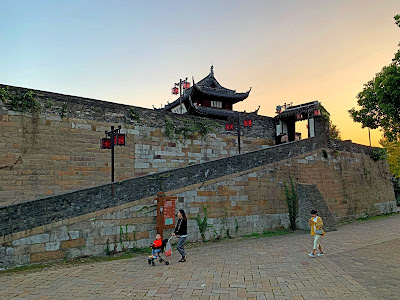From the Ruiguang Pagoda and garden, walk across this little bridge, over the Old Canal, and the City Pan Gate sits right in front of you!
Looking back to the Ruiguang Pagoda
It is Pan Gate or Pan Men or 盘门 (whereby Mén means Gate in Chinese).
The Pan Gate was built in 514 BC and was part of an ancient city wall that surrounded and protected Suzhou.
Suzhou, the cradle of Wu culture, has been recognized as one of the oldest towns in the Yangtze basin. King Helu of Wu built Suzhou, which was then known as The Grand City of Helu. There were 8 land and water gates built to protect the Wu Kingdom. Pan Gate was the only that consisted of both land and water gates and is the only one in existence today.
Wu Zixu Ancestral Temple
General Tower
The Land Gate
The Wu Gate Bridge
It was originally built in 1084 during the Northern Song Dynasty (960-1127) as a triple-arched bridge but reconstructed in the Qing Dynasty (1644-1911) as a single arched bridge. It is the highest ancient stone bridge in Suzhou. It is 36 feet high and 218 feet long.
Twist Switch Stone
One of the defense facilities in ancient times mainly established over the city gate for the purpose of resisting the enemy. Pan Gate consists of both water gate and land gate side by side, all of which have twist switch stone established to open or close the gate for attack or defense. The water gate's twist switch stone can not only resist the enemy but also control the water level.
Walking towards Wu Zixu Ancestral Temple
We did not know it was a temple. From above, it looked like an ancient family house. We were excited to explore it.
Wu Zixu 伍子胥 was a high minister of the State of Wu during the late Spring and Autumn Period (770 - 481 BC). Wu Zixu was King Helu's advisor.
There's the Pan Gate wall
It was locked! Wished it was a walk-in museum.
Wu Zixu
Main hall of the temple
Pan Gate
Main entrance of the Wu Zixu Temple
Walking out of the Pan Gate area into the gardens of Ruiguang Pagoda














































































No comments:
Post a Comment